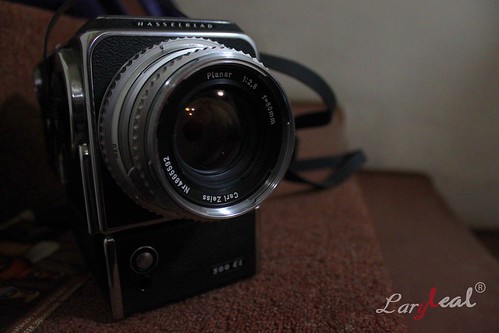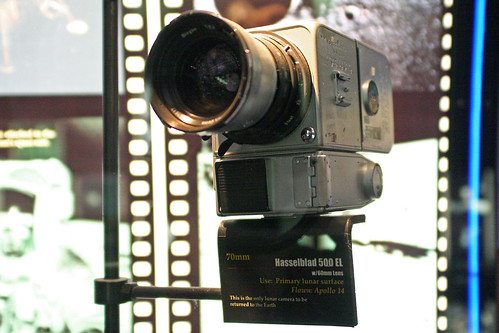Difference between revisions of "Hasselblad 500 EL"
m |
(more wording to describe drive mode) |
||
| Line 10: | Line 10: | ||
}} | }} | ||
| − | The '''500 EL''' was introduced by [[Hasselblad]] in 1965—essentially a [[Hasselblad 500 C|500 C]] with a permanently-integrated motor drive in the baseplate of the camera. Because the 500 C lacks an instant-return mirror, this automated winding was a helpful feature in quick-moving shooting situations. The side of the camera body contains the motor drive / mirror settings. It replaces the manual winder. The settings include '''O''' for normal operation, '''A''' for continuous mode, '''AS''' for continuous mirror up mode. The '''S''' is for mirror | + | The '''500 EL''' was introduced by [[Hasselblad]] in 1965—essentially a [[Hasselblad 500 C|500 C]] with a permanently-integrated motor drive in the baseplate of the camera. Because the 500 C lacks an instant-return mirror, this automated winding was a helpful feature in quick-moving shooting situations. |
| + | |||
| + | The side of the camera body contains the motor drive / mirror settings. It replaces the manual winder. The settings include '''O''' for normal operation, '''A''' for automatic continuous mode, holding the shutter release will result in 1 fps exposure. '''AS''' automatic speed for continuous mirror up mode. The '''S''' is for speed, the mirror is up for the duration of the exposure and '''SR''' is for speed repeat prerelease with the mirror remains up on every exposure. Typically the best way to use the S modes is to compose in normal mode with the mirror down, then switching to the S modes. | ||
The 500 EL was famously adapted by [http://en.wikipedia.org/wiki/NASA NASA] for the [http://en.wikipedia.org/wiki/Apollo_program Apollo moon program] (although the moonwalk cameras omitted the [[reflex finder|reflex viewing]] of the stock model). A number of 500 EL's remain abandoned on the lunar surface. | The 500 EL was famously adapted by [http://en.wikipedia.org/wiki/NASA NASA] for the [http://en.wikipedia.org/wiki/Apollo_program Apollo moon program] (although the moonwalk cameras omitted the [[reflex finder|reflex viewing]] of the stock model). A number of 500 EL's remain abandoned on the lunar surface. | ||
Revision as of 15:12, 5 August 2012

|
| Hasselblad 500 EL image by Lary Leal (Image rights) |
The 500 EL was introduced by Hasselblad in 1965—essentially a 500 C with a permanently-integrated motor drive in the baseplate of the camera. Because the 500 C lacks an instant-return mirror, this automated winding was a helpful feature in quick-moving shooting situations.
The side of the camera body contains the motor drive / mirror settings. It replaces the manual winder. The settings include O for normal operation, A for automatic continuous mode, holding the shutter release will result in 1 fps exposure. AS automatic speed for continuous mirror up mode. The S is for speed, the mirror is up for the duration of the exposure and SR is for speed repeat prerelease with the mirror remains up on every exposure. Typically the best way to use the S modes is to compose in normal mode with the mirror down, then switching to the S modes.
The 500 EL was famously adapted by NASA for the Apollo moon program (although the moonwalk cameras omitted the reflex viewing of the stock model). A number of 500 EL's remain abandoned on the lunar surface.
The EL was succeeded in 1971 by the 500 EL/M.
Links
- Hasselblad 500 EL profiled at Karen Nakamura's Photoethnography.com
- Hasselblad 500 EL manual at Mike Butkus' OrphanCameras.com
- Hasselblad Space Cameras at Hasselblad.com

|
| Modified 500 EL used on Apollo 14 moonwalk image by GregF422 (Image rights) |